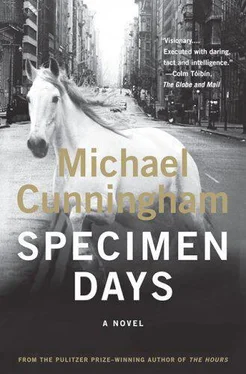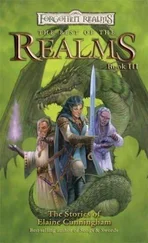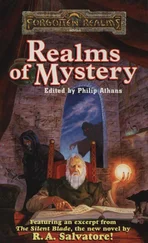Michael Cunningham - Specimen Days
Здесь есть возможность читать онлайн «Michael Cunningham - Specimen Days» — ознакомительный отрывок электронной книги совершенно бесплатно, а после прочтения отрывка купить полную версию. В некоторых случаях можно слушать аудио, скачать через торрент в формате fb2 и присутствует краткое содержание. Город: New York, Год выпуска: 2005, ISBN: 2005, Издательство: Farrar, Straus and Giroux, Жанр: Современная проза, на английском языке. Описание произведения, (предисловие) а так же отзывы посетителей доступны на портале библиотеки ЛибКат.
- Название:Specimen Days
- Автор:
- Издательство:Farrar, Straus and Giroux
- Жанр:
- Год:2005
- Город:New York
- ISBN:0-374-70515-1
- Рейтинг книги:4 / 5. Голосов: 1
-
Избранное:Добавить в избранное
- Отзывы:
-
Ваша оценка:
- 80
- 1
- 2
- 3
- 4
- 5
Specimen Days: краткое содержание, описание и аннотация
Предлагаем к чтению аннотацию, описание, краткое содержание или предисловие (зависит от того, что написал сам автор книги «Specimen Days»). Если вы не нашли необходимую информацию о книге — напишите в комментариях, мы постараемся отыскать её.
Specimen Days — читать онлайн ознакомительный отрывок
Ниже представлен текст книги, разбитый по страницам. Система сохранения места последней прочитанной страницы, позволяет с удобством читать онлайн бесплатно книгу «Specimen Days», без необходимости каждый раз заново искать на чём Вы остановились. Поставьте закладку, и сможете в любой момент перейти на страницу, на которой закончили чтение.
Интервал:
Закладка:
Catareen did not respond.
Emory took them into the farmhouse. He said, “There are beds upstairs. Perhaps we should take the boy up there and let him sleep a little.”
“Absolutely not,” Luke said. “Luke-”
“I’m hungry. I’m starving. We all are. Have you got anything to eat?”
“Of course,” Emory said. He led them through the foyer into a kitchen. They passed what had been the living room and was now an office with two desks, one steel and one plastimorph. Pushed to one side were two ratty armchairs and a glass-fronted cabinet that held a collection of brightly colored odds and ends. Simon recognized them: a Chia Pet shaped like a lamb, PEZ dispensers, a pink plastic squeeze bottle of Mr. Bubble, a rubber statuette of Bull winkle the Moose in a striped bathing suit from the 1800s.
The kitchen was like a kitchen from fifty years ago. It had an atomic stove and a refrigeration module and a sink with a faucet and handles. It might have been a display in a historical museum.
“Sit, please,” Emory said, indicating a battered wooden table surrounded by mismatched chairs. The table was covered with a cloth that depicted dancing blue teapots.
Simon, Catareen, and Luke sat at the table. Emory set down three glasses and a pitcher of what appeared to be tea. He took eggs and bacon from the refrigerator.
He said, “Today of course is the twentieth. We’re set to leave tomorrow.”
As he spoke, he cracked eggs into a bowl. He put slices of bacon on a grill.
Luke asked, “And this new planet is?”
“We call it Paumanok. It will take thirty-eight years for us to get there. Some of us will no longer be alive when the ship lands.”
“Hence the children.”
“Yes. And they’re our children. We would naturally take them along.”
Emory poured the eggs into a pan. He said, “I got the ship from the Jehovahs. They sold the whole fleet after things fell apart with HBO.”
“And what exactly do you know about the planet in question?” Simon asked.
“It’s the fourth planet from its sun. It’s about half the size of Earth. It is probably temperate and almost certainly has a breathable atmosphere. We can’t know whether or not there’s life there.”
“And the worst-case scenario is?”
“Well. It could be entirely barren. It could be too hot or too cold to sustain life. There is of course a very narrow range in that regard. Even a small variation would render it unlivable.”
“If you get there and find it unlivable?”
“There we’ll be. There’s no way of getting back.”
“Got you.”
“We’ve had visions,” Emory said.
“Visions.”
“Myself, Othea, and some of the others. We’ve been seeing a world of mountains and rivers. We see enormous fruit-bearing trees. We see brilliantly colored birds and small, intelligent animals that are like rabbits. I had the first such vision several years ago, and when I told Othea about it she confessed that she had had a similar one, months earlier, but hadn’t mentioned it.”
“That’s very Nadian,” Simon said.
“When I told the group about it two others, a child and an old man, stepped forward and said that they, too, had imagined this world in just this way. Since then the visions have come to many of us, at unpredictable times. They’re always the same, though they keep expanding. I was visited just last week by an image of a small fishing village on the shore of a vast sea, though I couldn’t see anything of its inhabitants. Twyla, the group’s second-oldest child, clearly saw a warm rain that swept through every afternoon and lasted for under an hour, after which it was brilliantly clear again.”
Simon glanced at Luke and Catareen. Catareen (of course) was expressionless. Luke, however, returned a signifying look. Crazy. These people are crazy.
“We understand that it’s a risk,” Emory continued. “It’s a risk we are all willing to take. We prefer it to remaining here. All of us do. You’re welcome to come with us, if you decide you’re willing to take the risk, too.”
“We’ll have to think about it, won’t we?” Simon said.
“You have about thirty-two hours to decide. Here, then. Your food is ready.”
After they had eaten, Emory took them upstairs and guided them into bedrooms that were spare and white, each containing only a bedshelf and a wooden chair. Luke and Catareen settled in. Simon asked to speak privately to Emory.
“Certainly,” Emory said. “I suppose you and I have a few things to discuss, don’t we?”
They went outside and crossed the farmyard, where the children were engaged in some sort of noisy and contentious game that the horse watched with blank-eyed, somnolent attention, twitching its tail. Beyond the children, the spaceship stood like a titanic silver clam, delicately balanced on the slender legstalks that had proved insufficiently stable in three out of five landings.
“Twyla loves that horse,” Emory said as they passed the children. “She keeps insisting we can take it with us.”
“Paumanok,” Simon said.
“Seemed like as good a name as any.”
“Starting from fish-shape Paumanok where I was born… solitary, singing in the West, I strike up for a New World.”
“Yes, yes.”
They walked past the barn, into a field scattered with purple clover.
“Why the poetry chip?” Simon asked. “Everybody loves poetry.”
“Come on.”
“All right. Well. I let myself get carried away when I designed you. You were supposed to be sturdy and reliable. Obedient. And harmless. And without emotional responses.”
“Got that.”
“The first few tries were seriously flawed.”
“So I’ve heard.”
“Certain qualities stowed away in the cell lines. It surprised everyone. There were, as it turned out, some very difficult-to-detect dark spots on the genome, little indicators and determiners that produced, well… unexpected results. The first experimental simulos were suicidal. Despairing. We tried to override that with a survival chip. Then the second batch turned out to be these sort of wildly happy murderers. They were ecstatic all the time. They were so very very happy they got violent. As if their happiness couldn’t tolerate any lesser outlet. One of them tore a lab technician to pieces, laughing and babbling on about how much he loved the kid. Ate his liver. This was hushed up.”
“Naturally.”
“We were hubristic. We underestimated the complexity of the genome. We kept finding that if you tried to eliminate one quality, some other quality that seemed entirely unrelated would pop up at ten times its normal intensity. Frankly, if we’d adequately anticipated the difficulties, I suspect we’d never have made you at all. But once we’d started, we couldn’t stop. No, / couldn’t stop. Others had the good sense to just cancel the experiments and call the whole thing an interesting idea that didn’t work out.”
“You think of me as an experiment,” Simon said. “I don’t mean to offend you.”
“Go on.”
“All right. In the third protocol, I gave you poetry.”
“Why?”
“To regulate you. To eliminate the extremes. I could put a cap on your aggressive capabilities, I could program you to be helpful and kind, but I wanted to give you some moral sense as well. To help you cope with events I couldn’t foresee. I thought that if you were programmed with the work of great poets, you’d be better able to appreciate the consequences of your actions.”
“You programmed each of us with a particular poet.”
“I did. I thought it might be less confusing for you that way. Somewhere out there, there’s a Shelley, a Keats, a Yeats. Or there was. I wonder what’s become of them.”
Читать дальшеИнтервал:
Закладка:
Похожие книги на «Specimen Days»
Представляем Вашему вниманию похожие книги на «Specimen Days» списком для выбора. Мы отобрали схожую по названию и смыслу литературу в надежде предоставить читателям больше вариантов отыскать новые, интересные, ещё непрочитанные произведения.
Обсуждение, отзывы о книге «Specimen Days» и просто собственные мнения читателей. Оставьте ваши комментарии, напишите, что Вы думаете о произведении, его смысле или главных героях. Укажите что конкретно понравилось, а что нет, и почему Вы так считаете.












